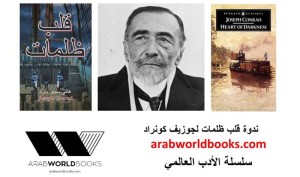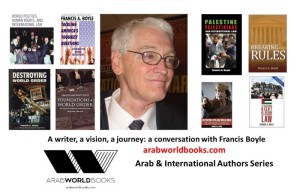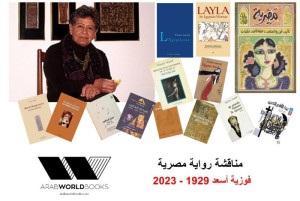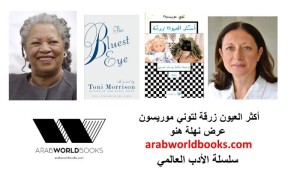Ahdaf Soueif, the world's top-selling Egyptian writer working in English, on literature, politics and how the politics of literature has seen her likened to Joseph Goebbels
By Manal el-Jesri
Egypt Today ' May 2006
Literatry sensation and activist Ahdaf Soueif is everything one may imagine her to be, from the top of her well-coiffed head to the tips of her manicured fingernails and her chic, but simple, attire. In fact, she looks like one would imagine an older Asya El-Ulama (the female protagonist in Soueif's first novel, In the Eye of the Sun) to look: very well turned out. Behind the cosmopolitan fa'ade is the bestselling Egyptian novelist writing in English today, a woman who writes about us and is read and enjoyed by Western readers.
She has already achieved what many writers strive a whole lifetime to accomplish. Soueif's visit to Cairo last month sparked an unusual degree of interest, prompting her to set aside a day for interviews. I watched her from across a busy hotel lobby as she carried out a long interview with an Egyptian daily newspaper. All day, she gave one interview after the other, and frankly, I was worried.
How many profound interviews can one person give in one day?
An obvious multi-tasker, Soueif was hardly a disappointment. We grant our celebrities halos and put them on a pedestal, and I was worried that Soueif would not live up to the image in my mind. One of my favorite writers, she has written two short story collections, Aisha and Sandpiper, in addition to two novels, the second of which (The Map of Love) was shortlisted for the 1999 Booker Prize. Her latest book, Mezzaterra, is a collection of articles, some of which were written after a visit to Palestine. It has already earned her the title 'The Next Edward Said,' although some detractors have compared her to the Nazi propagandist Josef Goebbels.
Soueif lives in England, where she works as the executive officer for Al-Furqan Islamic Heritage Foundation, takes care of her two sons, writes the occasional column, gives lectures, and hopes to squeeze in a little writing.
'When do I write? That's a very good question. My last novel was in 1999. [After 9/11 and 7/7] since I live in England, I find myself all the time having to respond to things that happened,' she says. 'It is a responsibility, and it takes up a lot of time. It puts you in a different frame of mind than the one you need to write a novel. You need space in your head for things to be born.'
Soueif has lived in England most of her adult life and says the English language is her tool of choice. Although she was criticized by Arab intellectuals for writing in a foreign language, she has since been accepted for who she is. I believe it is her activist work and the lectures she gives all over the world to promote the cause of Arabs and Palestinians that have gained her deep respect from her Arab counterparts. In all the interviews she has given to the Arab press, it was this aspect of her work and her life that was probed the most.
Being the fan of her works that I am, I have to exhaust the topic of creative writing first. Asya (the protagonist of In the Eye of the Sun) vs. Anna (The Map Of Love). Many of those who have read both novels feel strongly towards her characters, strongly preferring one over the other. Soueif herself has noticed this ' and is surprised by it.
'In fiction, first of all you work from the area that you feel passionately about,' she explains. 'In The Map of Love, I was concerned about the idea of feelings [and whether they can travel] across cultures. The other concern was how much of a personal life do we have. To what degree is our personal life affected by geographical location or through where we are in history?
'But essentially what you do is create characters. At first, the idea is you want characters from two different cultures, and you sort of know what kind of time you want. But then the character has to come and acquire its own distinction. You start moving within this historical-geographical parameter that you have created, and through the characters you explore this idea, of how much freedom you have, what are the pressures you have, and so on. But essentially, you have nothing without the character.'
Politics is a strong theme in both novels, be it the post-revolutionary era of In the Eye of the Sun or the post-Orabi revolution and the current threats of terror and the dilemma of the modern Egyptian intellectual in The Map of Love. 'Some nations at one time or another are more affected by politics. Maybe if I were a novelist working in Ancient Egypt when everything was fine, [I wouldn't have to write about politics],' Soueif muses.
Or an American before 9/11, which is basically the same thing? I ask. The author giggles, 'Yes, true, which is why I guess people say the American novel in the 1990s had ceased being a novel of ideas.'
Is the character of Asya, a child of the 1960s, part of Soueif, who was herself a child in the 1960s? 'Her consciousness, her personality, her ambitions are all mine as I remember them at the time. [In this novel], the characters are very much drawn out of life, which is not the case in Map of Love.'
Readers have tried to draw a parallel between Asya's growth and the development of the nation. Soueif is not very comfortable with generalizations. 'Nothing of this is conscious, but as you are writing you do not limit yourself to reality of characters and events. The character sort of grows and takes on a new dimension. Looking at the epilogue, there is the Pharaonic statue, the Islamic cemeteries and the folk story. They are all cultural aspects of Egypt. But what I can say is it was not done consciously. What is very interesting in the creation of any art is the interplay between what is conscious and what isn't.'
Working on an unconscious level, allowing her characters to move as they are destined, Soueif is often surprised at the symbols her fans find in her work ' work she herself does not re-read.
'I never have. Once I read the proof, khalas, it's over. I think as an artist you do not want to look too closely. You just want to get on with it, let it happen. As a novelist, you work with the particulars, and you hope that if you're true to the particulars, then what you're doing will have a general significance. You can't be thinking of the general while you're writing, because you just turn your characters into symbols.'
Anna, the nineteenth-century British woman in Map of Love, provides an entry point for Western readers. Soueif, throughout her career, has criticized and analyzed the relationship of the Orientalists with the East, and Anna is everything Orientalists were not. Has anything changed in the way the West perceives us?
'It is kind of worse. There is bias. It is hard for me to come into contact with it. Mostly when people write to you or to your publisher it is because they want to tell you they like you or they feel with your work. When I write articles, I put my email address to gauge audience reaction. Most of the response is positive, but you get some negative. The negative tends to be completely irrational and abusive. It doesn't engage with you on an intellectual level.'
A critic of Mezzaterra compared Soueif to a Nazi, because she was describing the pressures and injustices under which Palestinians live. 'They do not just criticize you, but your whole race and nation. I just feel a bit horrible for a while, and I feel I want to go have a shower. You brace yourself and you learn, but I can't see how what I write can be like Goebbels. I try to find the rationale, but I can't.'
The LA Times described her book Mezzaterra as ominous and anti-Semitic. Although Soueif tries to be as objective as possible, she explains. 'Because I am writing in the West, and because there is always this tohma (accusation), in the article 'A Letter to Blair,' which is about the Israeli invasion, everybody I quote is Israeli. I quote Israelis who speak like we do. They still tell you you are an anti-Semite and these people are self-hating Jews. Then khalas, the parameters are set, and if you are biased you're biased.'
Although no legal action has been taken against her, Soueif is not optimistic after the new English anti-terror laws, which can see authors jailed if they are deemed to be promoting 'hate' or 'glorifying' terror.
'You know how to do things, to say what you want without opening yourself up, so far. But now they have started this bill about the glorification of terror. Maybe if you write sympathetically about the Palestinians, you are glorifying terror. We'll just see how far the government pushes this issue.'
Soueif believes Western media and literature are helping the 'powers that be' in demonizing Arabs and Muslims the same way Jews were demonized in the past century.
'We are the target of the new imperial project. This is simply the spirit of the age, and this is why it is so crucial to keep on fighting. It is easier to bomb Iraq if your domestic audience in the West sees Iraq as an undifferentiated mass of fanatics rather than as individual people. It all feeds into itself, although there are a few voices rising [against this]. There is a struggle. You can look at a lot of media outlets and see there is a struggle within them as to how to perceive and how to represent, whether they are fair to this or not, and that's a good thing.
'This is partly brought about by the fact that the Palestinian issue is clear. They got it now. What they use to muddy the moral issue is the suicide bombing. That's the only thing. The rest has been uncovered. That is one thing giving impetus to a lot of people to try to work against the current. The war on Iraq has taken so long, and they have done terrible things there, and they will continue to do them because the resistance is there. People are starting to be more and more aware and to address this and try to write about it, and so the government is trying to clamp down on them. Internal conflict is there and the longer the situation the louder the protest will be and the fiercer the government will be in trying to quiet them. People see what is really happening, but the price is terrible.
'The West has always wanted the same thing from our part of the world: our resources. But the attack is worse now because it is a unipolar world. That's why I think it's such a ferocious attack on us, and not just in terms of bombing but in cultural terms. There is a serious attempt to discredit our culture.' It is a time of crisis, she says, and what she calls the 'West's attacks' are likely to stall the development of freedom and democracy in the region. 'And [the attack] hasn't reached its climax. People in the US believe if there is an area of chaos, like in Iraq, that is not getting solved, let's make it wider, make more chaos. Include Iran and Syria. For us who live in the line of fire, it just gets more difficult.
'I was there when 7/7 took place. It was quite dreadful. But it must be said that people in general seem to understand. It is the media that pushes and pushes. The average English person is more aware, unlike the average American. There is a great deal of ignorance. You can live in Ohio, for example, and not know anything about the rest of the world. It is a sad state of misinformation that makes you act in a certain way.'
'My real concern at the time being, though, is to get my next novel written, because I have enough of it in my head to feel I need to sit quietly in a room for three weeks for it to emerge, then I can handle other things around it.'
Soueif was good enough to whet my appetite with a sneak peek of her idea for the new novel. 'All I know is that it will be in two times, one is contemporary and one is in Ancient Egypt.' I can't wait.




